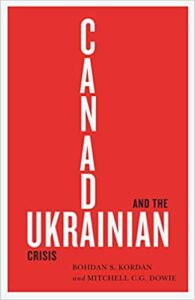
Buy at Amazon.ca (Affiliate link.)
In this edition of Knyzka Corner, we will be discussing Canada and the Ukrainian Crisis by Bohdan Kordan and Mitchell Dowie.
Canada and the Ukrainian Crisis examines how Canada supported Ukraine after Russia’s annexation of Crimea and the destabilization of Donetsk and Luhansk in 2014. This bilateral relationship has continued to evolve as it adapts to the changing realities in Ukraine, “We acknowledge that the world is increasingly defined by rapid and significant change, and that Russia’s attempt at rewriting the international rules of the road represents a particular challenge to Canada’s interests.” (p. x)
Since 1991 when Ukraine gained its independence from the Soviet Union, Canada has had a close relationship with Ukraine. Under both Liberal and Conservative governments, Canada provided Ukraine with economic and political aid. However, in 2014 under Conservative Prime Minister Stephen Harper, there was a significant change in support. “Responding to Russia’s aggression against Ukraine, Prime Minister Stephen Harper took measures expressing Canada’s solidarity with the new Ukrainian government while demonstrating Canada’s disapproval of and opposition to Russia’s actions.” (p.3) The Harper government’s statements and actions were both “candid” and “bellicose” in their response to Russian aggression in Ukraine.
Kordan and Dowie’s Canada and the Ukrainian Crisis has five chapters. The first two chapters examine Canada’s position on the international order and how the Ukrainian Crisis changed this position. In the third chapter, Canada’s support for Ukraine is examined in detail. The last two chapters analyze Prime Minister Stephen Harper’s worldview and its impact on his Ukraine policy.
According to Kordan and Dowie, since the end of World War II in 1945, Canadian foreign policy has supported the maintenance of a rules-based order in the international community. This policy endured throughout the Cold War, the formation of NATO and other international organizations. Canada followed the lead of the United States, but it did not take a major role in foreign policy engagements. When Ukraine gained its independence in 1991, Canada supported Ukraine’s efforts to become a democracy following international norms.
In 2014, Russia challenged the post-Cold War order. “Russia’s willingness to use military force to seize and annex the territory of its neighbour was indicative of its resolve. No other state was so fully committed to the project of revising the status quo.” (p. 29) Vladimir Putin’s actions were a threat to world peace because of Russia’s permanent membership on the UN Security Council and its nuclear arsenal. Canada supported the sanctions on Russia, sent advisors and military trainers to help Ukraine shore up its military, and increased Canadian participation in NATO military forces. The Ukrainian-Canadian community supported Harper’s firm stance on Russia and his sharp criticism of Russian aggression. Harper was the first G7 leader to travel to Ukraine after the events of the Euromaidan. He met with Ukrainian officials to find out how Canada could immediately support Ukraine and later supported projects which would strengthen Ukraine politically and economically.
Harper believed that standing for Ukraine was standing for Canadian values. In this way, his approach mirrored American foreign policy. “Stephen Harper’s embrace of America’s global agenda was unprecedentedly vigorous and unambiguous. However, he also wanted the US to go much further in supporting Ukraine. Principles were at stake. The defence of Ukraine was a litmus test of the strength and resilience of the rule-based order.” (p. 70)
Readers who are interested in international relations, Ukrainian history, Canadian-Ukrainian relations, as well as Canadian politics will be intrigued by this analysis. Researchers will definitely appreciate the addition of a Chronology of the Harper Government’s response to the Ukrainian Crisis. Stephen Harper’s response to the Ukrainian Crisis of 2014 was robust, and his rebuke of Russian aggression was powerful. Harper argued that Putin’s actions in Ukraine would only embolden him in the future. Unfortunately, this turned out to be true when Putin invaded Ukraine in 2022.
Bohdan S. Kordan is a Professor of International Relations in the Department of Political Studies at St. Thomas More College at the University of Saskatchewan. He has held teaching and research positions at the University of Alberta, University of Toronto and MacEwan University. He was the Founding Director of the Prairies Centre for the Study of Ukrainian Heritage. His research interests include: Nationalism, Canada-Ukraine Relations, Canadian Multiculturalism, and Contemporary Ukraine. He has published extensively including No Free Man: Canada, the Great War and the Enemy Alien Experience (2016) and Strategic Friends: Canada-Ukraine Relations from Independence to the Euromaidan (2018).
Mitchell C. G. Dowie is a fellow of the Ramon Hnatyshyn Canadian Studies Centre at Yuriy Fedkovych Chernivtsi National University in the city of Chernivtsi in Western Ukraine.
Canada and the Ukrainian Crisis is available at Chapters/Indigo and Amazon. (Affiliate link.)
–Reviewed by Myra Junyk

